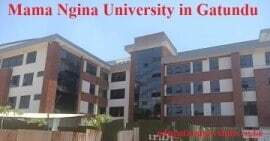The government through the Ministry for Higher Education has continued to enhance and invest in infrastructural developments in public universities across the country.
According to the Principal Secretary for University Education and Research, Amb. Simon Nabukwesi, the government has lined up major projects in the universities to boost student enrolment, teaching and research in higher education.
He said this is informed by the increasing demand for university education hence underscored the need to have the projects set up and rolling to ease congestion and accommodate the number of learners joining higher education.
He spoke at the Laikipia University when he inspected on-going development projects meant for laboratory, administration, libraries and lecture rooms where some of them have also stalled due to funding challenges.
However, the PS observed that high enrollment of primary schools, and 100 per cent transition from secondary schools, has forced institutions of higher learning and the government to initiate and increase these projects.
“Kenya has more than 40 universities, but the surging number of students seeking higher education has exceeded the capacity of existing facilities, especially in the seven public universities, locking out thousands of potential undergraduates.
“Education experts and university administrators have argued that additional enrolment can only be handled if the government pumps more funds into higher education, so institutions can afford to expand educational and boarding infrastructure and hire extra tutors,” said Nabukwesi.
On the other hand, the PS attributed issues of resources mismanagement in universities to high pending bills and underfunding as a result of competing priorities.
Laikipia University Vice Chancellor Kibet Rotich said there is a need for improved research in university education and mentoring of staff to enable them to deliver on their teaching and research activities.
“There is a dire need to increase collaboration with other entities across the world in an effort to enhance learning,” said Rotich.
However, he observed that infrastructural development was a major challenge at the university noting that some projects have taken too long to be completed and called on the government to intervene to ensure they are completed to hasten provision of sufficient space for research, space for students to learn and sufficient space for lecturers’ offices.
He lamented that stalled projects have hampered realization of the intended purpose and this has forced students to learn under incomplete lecture halls.

